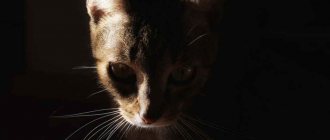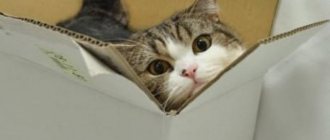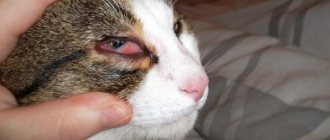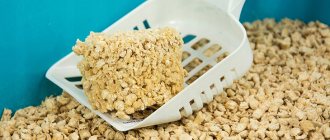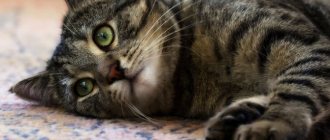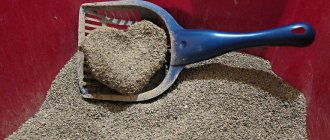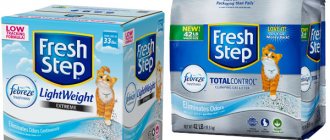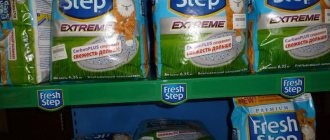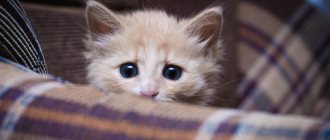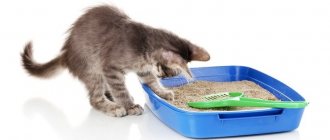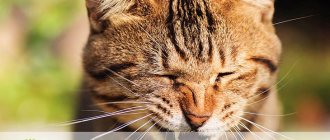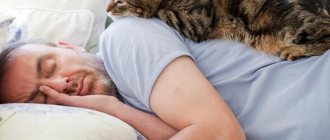The appearance of a small purring pet in a family becomes a joyful event that will bring many positive emotions in the future. However, there will also be a lot of worries: the baby must be accustomed to the norms of behavior in an apartment or house, and his regime must be controlled.
The most difficult moment for many owners is teaching a cat to use a litter box. It is at this moment that you can notice that the animal is eating the mixture from the toilet. There is no need to panic - you need to find out the reasons and apply conditions to eliminate them.
What needs to be done
The kitten is sneezing: why and what to do
What to do if your kitten eats litter:
- you need to carefully study the composition of the filler, which causes such interest in the animal. After this, it is necessary to introduce into the diet a vitamin-mineral complex containing substances that are in the filler;
- it is quite possible that the animal simply attracts the owner’s attention in this way. You need to buy your baby more toys and play with him more often;
- To sharpen teeth regularly, you need to give your predator bones or special pieces of calcite. Everything can be purchased at an affordable price in veterinary pharmacies and pet stores. It is recommended to give preference to beef bones, since chicken bones are dangerous to health.
Note! If none of the methods help, it is recommended to purchase another type of filler.
Harm of sand to a cat's body
If the use of sand was a one-time use, there is no need to worry about the health of your pet. However, if your cat regularly eats sand, this needs to be taken into account. If sand accumulates in the body in large quantities, it can have an extremely negative impact on health. Signs indicating the development of a pathological condition:
- lethargy and apathy, drowsiness;
- increased irritability;
- excessive aggressiveness;
- lack of appetite;
- excessive salivation;
- increased heart rate.
As soon as a cat begins to eat sand frequently, you need to immediately take measures to wean it off this habit.
The accumulation of sand in the intestines can cause intestinal obstruction - an emergency that can only be eliminated through surgery and is accompanied by a high risk of death.
How to wean it off?
As we have already found out, it is extremely undesirable for a cat to eat litter for food. The owner's action in this case is one of two things.
- Try talking to your pet. Take him in your arms, caress him and calmly explain to him that he cannot eat from the tray. The cat must understand that otherwise he will be punished. Naturally, it will be more difficult to “agree” with a playful kitten.
- Buy a special tray with a double bottom or cover the cat litter with a lid. This will hide the backfill from the kitten's view. But at the same time, the pet’s waste products will not be hidden, which will cause an unpleasant odor to appear in the apartment. This problem can be solved by frequent cleaning and washing of the tray.
Undoubtedly, if the pet does not want to give up a harmful “treat”, it is best for the breeder to completely remove all the fillers and buy a tray with a grid. Such a product will make life much easier for the cat owner and save money. In addition, the pet’s paws will be clean, since it will stop “spreading” the filler granules throughout the apartment.
Anxiety
The cat may start eating the mixture from the tray due to nervousness. If an animal is frightened or depressed, the “stress eating” instinct is triggered as often as stupor, aggression or panic activity. What can cause stress in a pet:
- moving;
- the appearance of a dog in the house;
- the arrival of guests or the arrival of a new family member;
- change of owners;
- sudden change in diet;
- experience of illness;
- increased noise level in the room, etc.
To calm the animal, try to give it attention, caress it, and pamper it with a treat. Let them know that everything is fine and the pet is safe. When moving, offer your cat his favorite toys and feed him from his usual dishes. When new “neighbors” appear, carefully introduce the cat to them and let them get used to it. If you cannot wean your kitten from a strange habit, consult with an animal behaviorist.
how to train a cat to use the litter box
What litter is best for kittens?
Fillers made from wood waste are considered the safest and most environmentally friendly.
That's what they're called - woody ones. Their granules are quite large and difficult for a kitten to swallow. In addition, wood pellets, when wet, literally crawl apart, turning into fine dust. So, even if swallowed, they will not cause the slightest harm. Another advantage of wood filler is that used wood filler can be flushed down the toilet (at least that’s what the manufacturers say). There is also a more exotic option - corn filler. It is similar to wood, but is made from corn waste. Absorbs moisture perfectly and retains odors, absolutely harmless, even if the kitten eats it. The disadvantages are the fairly high cost and high consumption. After all, it will have to be changed completely (unlike clumping).
Special fillers labeled “for kittens” are also absolutely safe.
What are the dangers of eating pellets?
Most manufacturers do not add any toxic substances to their raw materials. However, eating pellets from a litter tray is not the healthiest activity for a pet of any age. Particles of the mixture stick to the roof of the mouth and the cat's tongue, forming viscous lumps that are very difficult to spit out. This can lead to constipation or suffocation.
Silica gel granules can cause particular harm to health. They have good absorbent properties, and they swell greatly once they are in the animal's stomach. Their presence causes discomfort and can further lead to serious problems in the gastrointestinal tract. The most dangerous consequences are intestinal obstruction or severe poisoning.
Advantages
Silica gel is very popular among cat owners and this is not surprising, because when used correctly it has a lot of advantages:
- efficiency;
- does not generate dust when opening the package and pouring the contents into the tray;
- practically does not stick to the animal’s paws, so there is less dirt from it;
- retains moisture and odor well;
- does not cause allergic reactions in cats.
What to do if the kitten stubbornly tries to eat the litter?
There are few options here. The first - radical - abandon the filler completely. A tray with a grid is perfect for such purposes. On the plus side, you no longer have to spend money on buying filler. And the kitten will lose the habit of putting inedible things into its mouth. In addition, cleaning will be easier - there is a lot of dust from the filler, and the kitten will drag its particles throughout the apartment on its paws. And one more thing - you will always know exactly how often the kitten goes to the toilet and control the color, consistency, and smell. The filler quickly teaches owners not to pay attention to such trifles.
There are also disadvantages - you will have to wash the tray much more often. Sometimes - after each use. And the smell - now the aroma will spread throughout the house.
You can avoid the latter if you use filler, just pour it under the grate of the tray. This way, odors will spread much less, and the litter box will have to be cleaned only after pooping, usually 1-2 times a day for kittens. And filler consumption is reduced significantly. And the paws are clean.
What is the danger?
Eating litter from a litter tray is not the best thing for your pet. First of all, the granules of the mixture stick to the tongue and palate of the animal, and it is difficult for him to spit out this lump. In this way, the cat can “earn” indigestion.
Please note that most cat litter mixtures do not contain toxic substances. However, silicone gel fillers pose the greatest danger to a kitten. They have good absorbent properties. Once in the animal's stomach, the granules swell and cause a feeling of discomfort. In addition, lumps are very harmful to him. If a large amount of litter mixture gets into a cat's mouth and begins to clump under the influence of saliva, the animal may choke.
The safest fillers are wood pellets. They are quite large and your pet will not be able to choke on them. They also do not become lumps, but turn into dust under the influence of moisture - they can be safely flushed down the toilet. Another safe cat litter mixture is cornmeal. It is produced from environmentally friendly waste. It is absolutely harmless, but its cost is quite high. Also in pet stores you can find special fillers marked “for kittens.” Such mixtures are the safest.
The need to contact a veterinarian
Even if there are no signs of health problems and your pet looks great, you should seek help from a veterinarian. A qualified specialist is able to determine the substances that a pet is deficient in. By prescribing the medications necessary for use, the veterinarian will be able to calm the cat’s desire to eat fillers.
If you urgently contact a specialized animal clinic, you must take a box of litter with you. It is needed so that the veterinarian can clarify the drug that will be dealt with and more quickly navigate the content of emergency care for the pet.
If a cat is lethargic, weakly active, or sleepy, then it is necessary to ensure its delivery to the clinic as soon as possible, since there is a possibility that the mixture will be retained in the animal’s body and subsequent blockage of the digestive system. The main signs of emerging health difficulties may include:
- excessive aggressiveness;
- lethargy;
- excessive fearfulness;
- refusal to eat food;
- heart rate is too high;
- increased salivation.
As soon as it is noted that the animal is not indifferent to the litter from the tray, all measures must be taken to resolve the problem. Such behavior of an animal can lead to the most serious consequences, so it is extremely important to eliminate this habit as soon as possible.
Pet has mental health problems
A cat may eat litter if it has mental health problems or is stressed. The cause may be fear, moving to a new home, change of owner, or the appearance of another pet in the apartment. The owner of the animal should be aware that attempts to eat inedible objects and substances may be a symptom of rabies. This is a fatal disease that is also dangerous for humans, so a sudden interest in the filler is a reason to consult a veterinarian.
Physiological factors
Cats need calcium to maintain teeth and bone tissue. It usually enters the body with food. However, if it is of poor quality, the animal will begin to look for something to replace or supplement the food with. In this way, the cat tries to compensate for the mineral deficiency. How to fix the situation :
- Take the animal to a veterinarian who will prescribe vitamin complexes.
- Certain foods are excluded from the cat's diet or replaced with new ones that contain essential minerals.
© shutterstock
You cannot purchase vitamin complexes or medications for your cat on your own. Sometimes hypercalcemia and other complications occur. The animal may have some features that the owner does not know about, since he has not encountered this before. For example, intolerance to certain components, allergies, etc.
The second physiological reason why a kitten eats litter is to grind down its teeth. Despite domestication, a predator still “lives” in pets. Cats themselves try to take care of their teeth and claws by grinding them down on a hard surface. This is exactly the texture that fillers have.
There are two ways to deal with this:
- Feed your cat bones periodically. You need to choose solid ones or give tendons. They are sold in any pet stores. Cats also love to chew on pork or beef ribs, but chicken bones should not be given to animals.
- Buy calcite for your pet. This is a special stone. The cat will not be able to chew it completely, and the teeth are sharpened well.
If the animal has other options, it will not use toilet pellets for other purposes.
Psychological problems
Sometimes kittens eat the litter that fills the tray out of curiosity. The smell of the litter, to which special fragrances are added, can attract a kitten.
If a kitten has recently arrived in the house, it may experience emotional distress. Therefore, the litter for the tray is a kind of “stress eating” for him. The breeder needs to distract the pet from a bad habit with the help of toys or treats, and spend more time communicating with the kitten.
In rare cases, animals exhibit behavioral abnormalities, as a result of which the pet eats inedible objects for no apparent reason. In this case, you will need the help of a veterinarian.
The kitten needs toys so that there is no temptation to play with the litter
Psycho-emotional reasons
Kittens may eat inedible litter out of curiosity. The kids are still immature and are just beginning to learn everything. They can just try the filler on their teeth.
However, if a cat can easily spit out an ordinary toy or piece of paper, the clumping mixture sticks tightly to the palate or tongue. In cats it is very hard, with numerous small protrusions. As a result, animals have to swallow everything that gets into their mouths, including litter.
The cause can be stress in both small and adult cats. Severe discomfort can occur for many reasons - a change of environment, fear, the smell or presence of a dog, moving, etc.
© shutterstock
The fix is easy:
- the animal needs to be provided with maximum comfort and tranquility;
- give the cat more attention and time;
- periodically feed with “snacks”.
This will help correct unhealthy addictions. However, if the above tips did not help, the reason may lie in illness. Only a veterinarian can determine it.
Preventive actions
If a kitten eats a little litter, this is not dangerous to its health, but it may be a symptom of diseases of the digestive tract and you should consult a veterinarian.
If there are no deviations in health, then perhaps the kitten lacks attention and peace of mind. In this case, you need to give more affection and love to your small pet.
Spend time with your pet so that there is no reason for a bad habit to develop.
Grinding of teeth
Another reason for strange behavior is predator intuition. A cat needs to sharpen its claws and teeth to become comfortable. Just as he “attacks” furniture for claw treatment, he tries to sharpen the picket fence on solid particles of the litter box mixture.
The way out of the situation is simple - give the cat a hard treat in the form of brain bones. This edible will help him sharpen his teeth and bring him pleasure. Typically cats love to chew on beef and pork ribs. It’s best not to give small chicken bones to cats. Feed your cat carefully and monitor his well-being. In case of unusual behavior, you can always call the veterinarian.
In addition, when young kittens become ill, they look for an opportunity to stimulate this process. You can get your cat a special stone - calcite. It cannot be chewed, but the devil will effectively help your pet cut and sharpen its teeth.
Do not buy the elixir of life or any supplements for your cat yourself. Only an animal doctor can, according to the rules, diagnose the causes of deviations in a pet, and recommend safe means to solve the problem.
Other reasons
Any litter can attract a cat with its smell. Pet hygiene products contain different fragrances. Some attract cats with their scent. Sometimes, oddly enough, animals like such inedible food and begin to eat it. It’s very easy to wean a kitten off this – you just need to change the litter.
Animals can eat it out of boredom or in the presence of mental disorders. Otherwise, veterinarians call this problem “food perversion.” Sometimes the kitten eats the litter in an attempt to calm down. This way he feels some security. The kitten may chew on the litter when it is teething. During this period, the animal needs to massage its gums.
